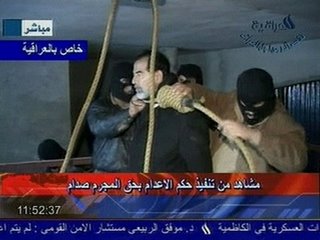To Resolve An Insurgency - Part III
For all its effort in reconstruction projects, the US has not been particularly successful in establishing basic security throughout Iraq. Specifically, Baghdad has become both the American and insurgent center of gravity in this country. By not ensuring basic security in Iraq’s major cities, the US has created fence sitters. A fence sitter is a citizen of a country that allows insurgents in/around his neighborhood and does not report them to the authorities. A fence sitter is important to an insurgent for the sole purpose of it gives the insurgent freedom of action from which to perpetuate his activity to overthrow the government. It is this “tacit support” of the population that allows an insurgency to grow and develop. It is from this “tacit support” that an insurgency gains approval from the populous and becomes ingrained in a society.
In the Insurgency Cycle, Iraq is currently somewhere between 10 or 11. The Iraqi government is the duly elected, legitimate government, but is perceived as weak- unable to provide for basic security, corrupt-unable to provide basic services, and ineffectual-unable to provide for vast employment. Maliki’s reconciliation plan, while gaining some inroads, is also faltering. How can the Iraqi government correct these perceptions?
First and foremost, a strong central government needs to be established. As stated above, this is the foundation of everything else. It must be strong to prevent a security breakdown and abandonment of law and order. To gain popular support and to get the fence sitters on its side, it also must be fair. In Iraq’s case, since it is a duly elected, legitimate government, it initially had the support of the people, it now needs to focus on the four pillars to become strong while maintaining its fairness. One of the first things that need to happen to ensure fairness is Maliki needs to ensure both Sunni and Shi’ites Soldiers/police are in the same units to stop sectarian death squads. They may not be split 50:50, but his units need to be integrated to ensure fairness.
Since Baghdad is the center of gravity for both the insurgency and the government, Maliki must focus on making Baghdad secure. Several methods have been tried, but none has had resounding success. However, it is time for Maliki to move Iraqi troops out of safer regions and bring Baghdad under martial law. The recent hanging of Saddam may very well be the impetus he needs to make such a move. He should request that foreign troops focus their efforts on securing Iraq’s borders to prevent external logistical support to the insurgents into his country.
He should declare Baghdad a “weapons free” zone. He should give an amnesty period and then if anybody is found with a weapon, that person should be jailed and then tried. He should use the police force and Iraqi Army to sweep the city from one side to the other to rid the city of weapons. If a known insurgent is found, that person should be summarily shot on sight.
Once Baghdad is clear of all weapons, he should ensure the police force maintains good order and discipline. If a member of the police, Army, or citizenry is found to be in violation of good order and discipline, that person should be tried and jailed whether Sunni or Shia, whether part of the clan/tribe/party in the government or not. Maliki should then move on to other cities where insurgency is rampant and declare marshal law and execute clearing operations in these other cities.
Quickly after executing security operations in each city, Maliki should engage in development projects employing the people in each city or town. He needs to establish all basic services quickly and employ as many people as possible. He should involve clan/tribal/party leaders to focus this massive development project in each city. While outside contractors may be able to do the job better, he must ensure all contracts stay in country to ensure the influx of capital back to the Iraqi economy. If somebody is found to be inflating prices or not providing services paid for, that person should be tried and jailed as an example to all others.
These methods, while harse, would re-establish law and order, provide security and legitimize the government. In addition, these methods would ensure the stakeholders, the Iraqis themselves, are involved in bettering their cities and are employed. By maintaining clan/tribal/party involvement in all developmental projects, he could ensure loyalty.
The difficult part of this scenario is for Maliki to not overstep his bounds and become another Saddam. However, this is a democratic country and has a working constitution. If he oversteps his bounds, he will not be re-elected or worse, he will lose his coalition and be thrown out faster. If he doesn’t and Iraq is secure, basic services are provided, employment is up, and clan/tribes/parties are involved, he may very well be re-elected.
I will discuss how the US needs to refocus its efforts in Part IV.





